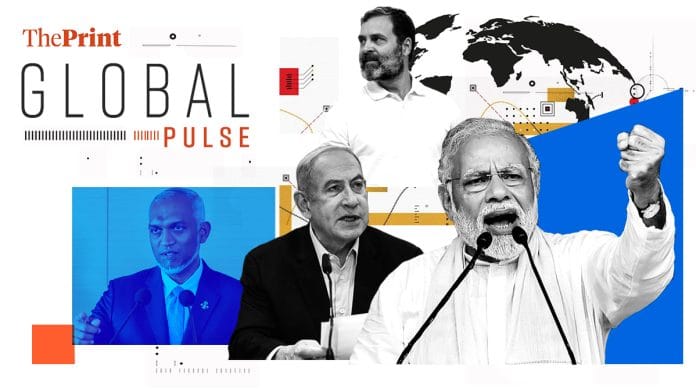New Delhi: Rahul Gandhi is easy to dismiss as a “privileged amateur leading an ossified party with neither the talent nor the ideas to govern the world’s most populous country”, says a recent report in the The Economist that analyses why India needs a stronger opposition than the Congress. The report highlights that under Gandhi’s leadership, the party garnered 20 percent of votes in 2019, down from 50 percent in the 1980s.
Noting that “a skewed playing field” — including a rigged contest and stifled dissent as alleged by the Opposition — is “only part of the problem”, the report says Prime Minister Narendra Modi’s “strongman persona combining Hindu chauvinism and Muslim-bashing with an emphasis on economic development and national renewal” helped him become popular. To revitalise the Congress, the report suggests transition to a younger, more dynamic leadership, a revamp of communication strategies, and innovative technology and policy solutions.
In a podcast, “Big business bets on Modi”, the Financial Times looks at how PM Modi is getting a big boost from Indian businesses in his re-election campaign. In the podcast, FT Mumbai correspondent Chris Kay says that the business community members he has spoken to see PM Modi as one of the most pro-business leaders that India has ever had.
Highlighting Modi’s achievements, Kay said the PM eased restrictions of foreign investments, pushed for the bankruptcy code, simplified the national goods and services tax, and slashed corporation tax, and upgraded the digital infrastructure. When the host asks what businesses will want from Modi if re-elected, Kay points out problems like long pendency of disputes in courts and delay in land and other clearances from states.
In a report by the New York Times, author Samanth Subramanian analyses how Rahul Gandhi continues to try unseat Modi to “change the nation’s course” despite time running out for his vision. “Indian pundits and journalists bicker about many things, but on this point they’re unanimous: Only a miracle will halt the BJP. Still, it falls to Gandhi, steward of his enfeebled party, to try,” the report says.
The report highlights Gandhi’s journey, his “hesitancy about power”, and the two yatras to challenge PM Modi’s BJP government. About Gandhi’s yatra through Uttar Pradesh, a battleground state symbolising India’s political landscape, the report says his message resonated with some, while others questioned his ability to effect change. The report, however, credits Gandhi with seeking to unite the nation against divisive politics and rising unemployment while confronting the BJP’s nationalist agenda, epitomised by contentious laws and religious polarisation.
In an opinion piece by The Guardian, author Kenneth Mohammed asks: “As India goes to the polls, can democracy deliver a better life for all of its people?” His article delves into global politics, focused primarily on the elections, in the backdrop of poverty, corruption, and societal challenges. “The incumbent prime minister, Narendra Modi, is contesting for a third term, making the fabric of the world’s largest democracy appear contradictory,” notes Mohammed.
As “969 million eligible voters” go to the polls in what is the largest democratic exercise globally, the piece highlights the paradoxes within India’s socio-economic fabric. Mohammed says this narrative underscores the importance of ethical leadership, civic engagement, and inclusive development in navigating India’s future, highlighting the pivotal role of the upcoming elections in shaping India’s trajectory, with a global audience keenly observing the emergence of transformative leadership capable of addressing the nation’s myriad challenges.
“What an Indian Deepfaker Tells Us About Global Election Security” — an article by Bloomberg highlights the role that deepfakes play in sparking fears of compromised polls around the world. The article brings forward the story of Divyendra Singh Jadoun, who calls himself “The Indian Deepfaker” and has transitioned from creating playful celebrity face swaps to producing deepfake videos for political campaigns in India.
With India stepping into its elections, AI-powered creations such as Jadoun’s have become sought-after tools for politicians aiming to sway voters through personalised messages, deepfake videos, and holograms. The article notes that due to this, concerns loom over the potential misuse of this technology in manipulating voters due to a lack of regulations on AI globally.
Muizzu wins in Maldives, Netanyahu picks a bone with the US
In Maldives, voters have backed “President Mohamed Muizzu’s tilt towards China and away from traditional benefactor India”, with his party winning control of parliament in an election landslide. Read the recent The Guardian report to know more.
As the US sets to impose sanctions on Israeli military units for alleged rights violations, Israeli Prime Minister Benjamin Netanyahu says he will fight any sanction. To know more, read the AlJazeera report.
(Edited by Madhurita Goswami)
Also read: Iran-Israel conflict will now be shaped by 3H—Houthis, Hamas, Hezbollah






